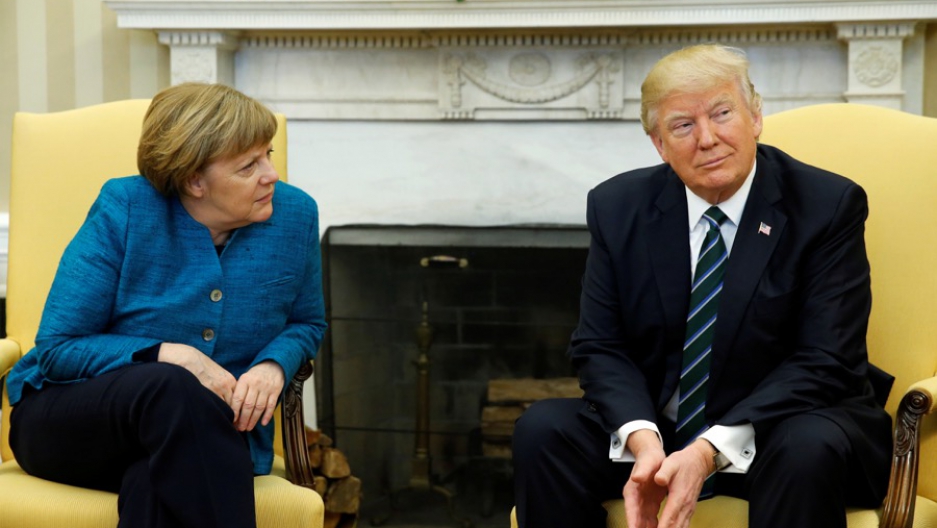
Relations between the U.S. and Germany have worsened. It is not easy to reverse that. A guest editorial for the Frankfurter Rundschau.
I am an American who has now been living in Germany for over 30 years. As such, I have experienced phases of anti-American sentiment. I think of the 1980s during the stationing of the Pershing II missiles. There was a saying then: “The shorter the range, the deader the Germans.” I also remember very well the U.S.-led coalition of the willing and their controversial invasion of Iraq in 2003. In Freiburg at the time I was asked multiple times to participate in petitions “against the Amis.” And now I think about the era of Donald Trump.
U.S. Secretary of State Mike Pompeo’s cancellation of his Germany visit a while ago and Donald Trump’s distance raise questions. Is the extreme cooling of German-American relations related to Trump’s Europe strategy — to the extent that he even has one? Is it related to an antipathy against Germany, because of the trade deficit, because of German immigration policies, or because of Germany’s historically rooted aversion to arms buildup?
Angela Merkel Is the Person of the Year, Not Donald Trump
Or does Trump just hate Merkel? Because she has at times received more media attention than he, for instance when she was chosen as Person of the Year by the U.S. news magazine “Time” in 2015 and because she was, at least until the fall 2018 elections in Bayern and Hessen, lauded as the chancellor of Europe? Or because she is a rationalist, whereas he pursues a politics of emotions?
Trump is ahistorical. Merkel, in contrast, indicated at the NATO summit last summer that she knows very well what it was like when part of Germany was controlled by the Soviet Union. Or does Trump disapprove of Merkel because she, at a distance, resembles his former rival Hillary Clinton in looks and character?
Donald Trump Sees Enemies Everywhere
Merkel prepared herself thoroughly for her first meeting with Trump in Washington in March 2017. She did this in the same way that I try to make students in my seminars familiar with this presidency. She read his early interview with “Playboy” and his memoir “Trump: The Art of the Deal” (1987). She studied his self-portrayal in the reality show “The Apprentice.”
She was able to deduce the following model: Trump uses an agonistic discourse. He claims that he speaks for the true people and against all of his enemies. Only he can represent these people and fight for them and help them to win back their true greatness. He points to apparent enemies — China, Iran, Europe, Mexico — who hold back these people from their supposed greatness.
In doing so, he is conjuring up a nostalgia for a lost America and insisting on victimizing not only himself, but all members of the true “working class,” from whom social status and well-paid jobs are being taken, supposedly also by imported German cars and NATO members like Germany not being willing to pay for their security.
Donald Trump and Vladimir Putin: Two Great Boors United
Trump made it clear early on that he does not care about negative reporting about him, as long as he enjoys the lion’s share of attention. But it remains unclear if Trump deploys his anti-Merkel and anti-German rhetoric to impress other great boors like Russian President Vladimir Putin, or to create more space for his domineering, or just because people listen when he howls.
The euphoria over former U.S. President Barack Obama is more lasting in Germany than in the U.S., where he was elected. German antipathy against Trump also has a different tone than that of his many opponents in the United States. This German disappointment over an America under Trump is historically grounded.
I remember well the strong emotions of the 50-year celebration of John Kennedy’s “Ich bin ein Berliner” speech in the Haus am Dom in Frankfurt in 2013 and how contemporaries of Kennedy’s visit to Germany became misty-eyed as it was recounted. America was the savior and the great, well-meaning friend. That is not the case anymore under Trump and also not under Pompeo, who rejects multilateralism.
Impeachment is not the answer. That is too difficult to achieve under the U.S. Constitution. I also consider it unrealistic to believe that the Trump era will be over by 2020 at the latest. It is hard for a sitting president like Trump to be voted out of office. The Democratic Party with its more than 20 possible candidates also does not know what it wants. The answer needs to be a German and European strategy about how to deal with this dismissive and unilateral United States.

Leave a Reply
You must be logged in to post a comment.